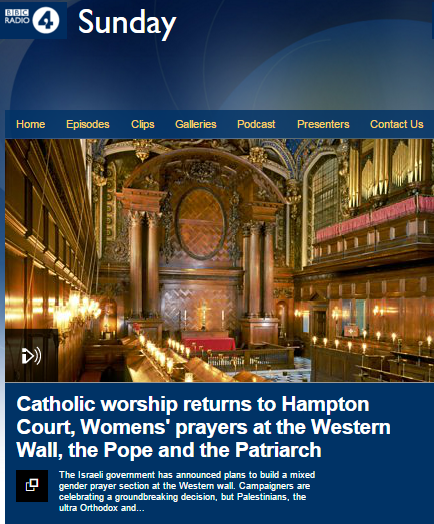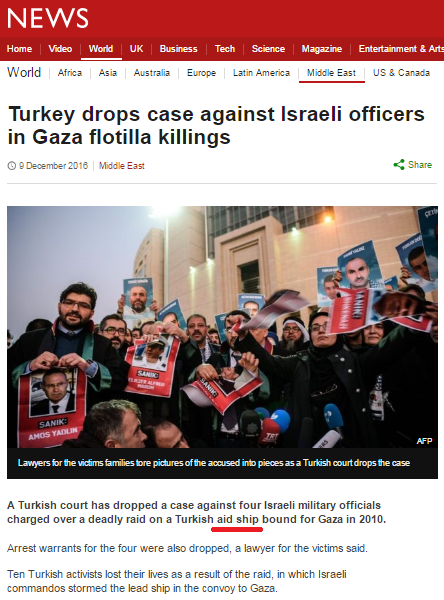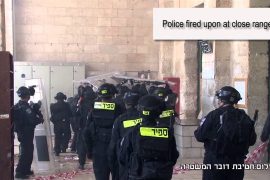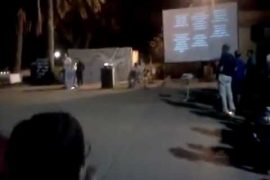Back in February we noted that an edition of the BBC Radio 4 programme ‘Sunday’ had promoted inaccurate information concerning the Western Wall.
“Presenter Edward Stourton introduced the item by telling listeners that:
“The Israeli government’s decision to approve a new area by Jerusalem’s Western Wall where men and women can pray together will mean some big physical changes at Judaism’s holiest site.”
The Western Wall is of course not “Judaism’s holiest site” – Temple Mount holds that title – and it is difficult to understand why that inaccuracy is repeatedly found in BBC content, especially in a programme which purports to focus on “religious issues”.
Later on, while discussing the story with journalist Judy Maltz, Stourton materially misled listeners by inaccurately claiming that the Waqf has authority over the Western Wall.
“There is also of course opposition from outside – isn’t there – from the Palestinians and from the Muslim authorities responsible for the area.” [emphasis added]
As the Times of Israel explains:
“While the Jordanian-run Waqf governs the top of the Temple Mount […] Israel maintains control over access to the site as well as areas below the Mount, as part of a status quo agreement in place since 1967. Israel does not allow Jews to pray atop the mount.””
BBC Watch submitted a complaint on those two topics which, as readers may recall, received an inadequate response from the BBC Complaints department.
“We’ve reviewed the programme for you and the Western Wall was referenced within a discussion about prayer. The description of the Western Wall as ‘Judaism’s holiest site’ was within this context- that it is the holiest place where Jews can pray.
Our presenter Edward Stourton also referred to “the Muslim authorities responsible for the area” which, I’m sure you can appreciate, is different from saying that Waqf have jurisdiction over the Western Wall.””
BBC Watch then pursued the complaint further and recently received the following reply:
“Thank you for taking the time to contact us and apologies for the delay in responding.
We contacted the series producer Amanda Hancox, who has forwarded the following:
“I’m sorry you weren’t happy with the response to your complaint about ‘Sunday’. You are right to say that the Temple Mount is regarded as Judaism’s holiest site. However, given the Western Wall is the last remnant of the retaining wall of the Temple Mount today many people do consider it to be the most sacred spot in Judaism because it is the last tangible remains of the Temple complex. I’m aware of the sensitivities about this so in future I will ask the presenter to say “one of….” rather than “the…”.” [emphasis added]
Precisely who those “many people” are and what is their level of expertise on the topic is not disclosed. The reply goes on:
“As regards the query about the presenter’s use of the phrase “Muslim authorities”, listening back to the interview the presenter said: “There is opposition from outside isn’t there, from the Palestinians and from the Muslim authorities responsible for the area.” In the context of the interview “the area” he was referring to was the expanded prayer plaza which Muslims believe is an inseparable part of al-Aksa Mosque, and the yard adjacent to the Western Wall which is Muslim- owned property. It was not his intention to refer to the Western Wall as being under Muslim control, which of course it is not. As such I’m sorry if it came across like that as it was not his intention.”” [emphasis added]
The discussion was actually about the establishment of a new mixed gender prayer area at the Western Wall and did not concern Temple Mount but it is nevertheless remarkable to see once again that the BBC has adopted the PLO’s directive concerning the description of the whole of Temple Mount as ‘Al Aqsa Mosque’.
The claim that “the yard adjacent to the Western Wall” – i.e. the Western Wall plaza – is “Muslim-owned property” is inaccurate: the area is actually state land as shown on the map on page 88 in this document compiled by Professor Ruth Lapidot.
BBC Watch will be pursuing the complaint further.




